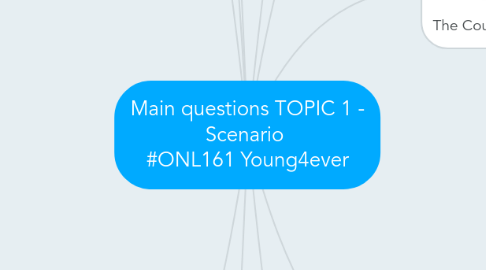
1. Communications of the course
1.1. Is the information of the course clear enough?
1.2. Is the structure of the course clear enough?
1.3. Is it clear for students how many time they have to plan for the course?
1.4. Did communication uses other tools than visuals for communication? (Visuals) because of those who read not so well.
2. Human interventions from organization
2.1. Is human help available before, during and after the course?
2.2. Does learners know how to reach human help?
2.3. Does human help is proactive on the community or only if needed?
2.4. When is human intervention needed?
2.5. How should we help students adapt to a new course's learning environment?
2.5.1. Support
2.5.2. Clear instructions
2.5.3. Follow the students
2.5.4. making peer-groups helping each other
2.5.5. encourage learners to spend time to discover and familiarize with the environment
2.5.6. Being clear in expectations
2.5.7. Being personal
2.5.8. Having some fun
2.5.9. It is easyer with fewer students
2.5.10. Welcoming and possibities to connect with peers and facilitators, warm atmosfere
3. Assesments of the course
3.1. Is formative assesments, peer reviews, reflective blogs included? Which place do they have
3.2. Is there use of Rubrics?
3.3. Is formative assesment relevant?
3.4. Lessons learned & next steps
4. PBL group
4.1. What is the role of the leader?
4.2. What are the groundrules of the group? See link:
4.2.1. Feedaback rules:
4.3. How often does the group meet in a synchronous session?
4.4. How often groupmembers check a-synchronous activities? And react on notifications?
4.5. Do they have a manage-ment plan? See link
4.6. Do they have contactinformation, so they can Skype each other e.g., see link
4.7. Is there a guideline for groupwork available?
4.8. what is necessary for good groupdynamics ?
4.9. Is the level of (communication) skills of group members on the same level? Are there some skills we could give some attention to? Which skills do they need?
4.9.1. Ask for help - groupmembers
4.9.2. Communicate with groupmembers in Adobe Connect pro
4.9.3. Communicate in English
4.9.4. Give feedback to groupmembers. See Brene Brown:
4.9.5. Using Social Media to communicate
4.9.6. Digital Literacy
4.9.7. Daring experiment
4.9.8. Writing reflective blogs
4.9.9. resilience is maybe a key literacy
4.9.10. Seeing yourself as a source (student)
4.9.11. Collaborative literacy
4.9.11.1. Make two people responsable for each topic
4.9.11.2. Learn to act
4.9.11.3. Agreement of responsabilities for the groupwork (commitment)
4.9.11.4. Take time to getting know each other
4.9.12. Networking profesionally
4.9.12.1. Conference
4.9.12.2. email
4.9.12.3. luchroom @ work
4.9.12.4. Twitter e.a. Social Media
4.9.12.5. Newsletters
4.9.12.6. doing a course
4.9.12.7. ta;lking in the train
4.9.12.8. send X-mascards
4.9.12.9. Global networks
4.10. Are group members familiar with tools and techniques. What do they need for improvement?
4.10.1. Google+
4.10.2. Doodle
4.10.3. Google Drive
4.10.4. Google Maps
4.10.5. Wordpress/ Blogger e.g.
4.10.6. Adobe Connect Meeting
4.10.7. Diigo
4.10.8. Twitter, tweetdeck
4.10.9. Facebook
4.10.10. LinkedIn
4.10.11. Skype / Facetime
4.10.12. Storify
5. We are: Lars, Victoria, Anne, Catherine, Robert, Fredric, Mona, Francisca
6. Preparation of the group members
6.1. How many preparing time do you have?
6.2. How do you prepare for a PBL problem?
6.3. What do you read?
6.4. Do we all have some time to prepare? How do we deal with differences in preparing time? Is it a problem that some peple prepare more?
6.5. What does our group think ofdividing the reading of background literature? Could we all read something? And share in the group?
7. Tools
7.1. Which tools do we need when learning online?
7.2. Which tools are really usefull?
7.3. Does tools helps with didactics online?
7.4. Are tools supporting or leading in education?
7.5. Service & support with audio problems
8. The Course
8.1. Is the content of the course relevant for a) the scaffolding of the student during the course and b) the use of tools/tecniques ? (Tasting wine? Physiotherapy? Spanish?)
8.2. Course introduction
8.2.1. It is OK to fail
8.2.2. Motivation & support
8.2.3. Curiosity
8.3. Clear Course design
9. The learner
9.1. How old is the learner? Is he a developped digital native or is he a digital immigrant? (35+) Visitors and Residents...
9.2. What is his level of knowledge, skills about the content of the course?
9.3. Is he trained in PBL-methods? Or is it his first time?
9.4. What is his motivation for doing the course? How does he stay motivated?
9.4.1. Direct & positive feedback
9.4.2. Experiment and know "what is in it for me"
9.4.2.1. Realistic situations, scenario's

